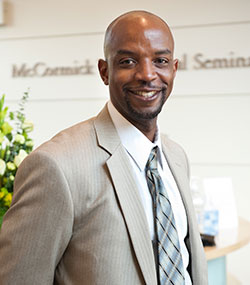
Reggie L. Williams received a 2015 First Book Grant for Minority Scholars for his project Harlem Renaissance Literature and Theology: Jesus and the Recovery of Humanity. Reggie shares with LI about his current work and his first book, BONHOEFFER’S BLACK JESUS: HARLEM RENAISSANCE THEOLOGY AND AN ETHIC OF RESISTANCE.
LI: Reggie, tell us about yourself.
RW: I am currently an Assistant Professor of Christian Ethics, at McCormick Theological Seminary, in Chicago’s Hyde Park neighborhood, where I began working in July of 2012. Before coming to McCormick, I spent a year as a member of the Religion Department faculty at Baylor University in Waco, Texas as a lecturer in Christian Ethics. I completed my Ph.D. in Theological Ethics from Fuller Theological Seminary in June of 2011. My wife Stacy and I celebrated 20 years of marriage on August 26, 2015. We have two beautiful teenagers, a son, 16, and a daughter, 14.
LI: Your first book Bonhoeffer’s Black Jesus: Harlem Renaissance Theology and an Ethic of Resistance has received great reviews. Can you tell us more about it?
RW: Bonhoeffer’s Black Jesus: Harlem Renaissance Theology and an Ethic of Resistance (Waco, TX: Baylor University Press, 2014) was an analysis of important theological developments that occurred during a year that the German pastor and theologian Dietrich Bonhoeffer spent as a post-doc fellow at Union Theological Seminary in New York.
LI: What are you working on now?
RW: I’m currently working on a project that is a concentrated look at theological ethics within the Harlem Renaissance, helping to mobilize the effort to recover and re-state humanity from the perspective of people assigned a pejorative role by white supremacy.
LI: What is the central focus guiding your First Book Grant for Minority Scholars project?
RW: My core claim is that the Harlem Renaissance, though not a Christian movement, included as a core organizing principle a theological ethic that argued for social interaction based on the notion of the co-humanity of all people. The movement sought to articulate a worldview and a culture that was distinctively African American, and in order to do that it necessarily had to draw on the worldview of a people who were singularly religious. Yet the majority of the intellectuals did not claim a confessional Christian commitment. Their articulation of the family of all humankind, with a corresponding social ethic was derivative of African American Christianity yet discontinuous with it as confessional commitment. It is this discontinuous continuity that opens a space to critically express a new social reality that includes an articulation of a different anthropology than the one present within the dominant society, sourcing dominant expressions of Christianity and white supremacy. This creative discontinuous continuity was the funding source for the writing, music, and artwork of the Harlem Renaissance.
LI: What have you found most interesting or surprising about your Harlem Renaissance research?
RW: I have been fascinated by the contemporary relevance of the voices from the early 20th century on the topic of race and the argument for valuing black humanity. I’ve also very much enjoyed working to put my finger on an argument that eludes articulation. It is this move within the non-confessional theological, while speaking to various modes of white supremacy, that is a historical black project. From Harlem to Ferguson, black people have drawn on theological themes as they address white supremacy, in order to reclaim and restate black life as human life. I find myself working with this historical reality as theology, a theology that is critical of social systems and structures, and operating as a new social reality. This has all been surprising and fascinating at the same time.
LI: Anything else we should know about your project and your grant experience?
RW: This is brand new research taking a look at this historical subject matter in a very different way, looking at previously overlooked content. I was fascinated by all of this while writing my first book, and I knew that I’d have to have this second project to work out in a serious engagement with the archives, what I recognized as uncharted territory. I’m so thankful for the opportunity to do this work!